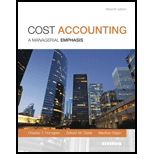
1.
Efficiency Variance:
The efficiency variance refers to the difference between the actual quantity for the input for an output level and the budgeted quantity of input required for the given output level multiplied by the budgeted input price.
Spending Variance:
The spending variance refers to the difference in the actual price of input and budgeted price of input multiplied by the actual quantity of the input.
Production Volume Variance:
The production volume variance is the difference in the budgeted amount of the fixed
1.
The direct labor efficiency variance.
2.
The denominator level and the spending and efficiency variances for total overhead.
3.
To explain: The way in which the individual fixed manufacturing overhead items can be controlled from day to day and the way in which individual fixed overhead items are controlled.
Want to see the full answer?
Check out a sample textbook solution
Chapter 8 Solutions
Cost Accounting, Student Value Edition (15th Edition)
- Cozy Retreats currently sells 420 Standard hot tubs, 580 Luxury hot tubs, and 190 Premium model hot tubs each year. The firm is considering adding a Comfort model hot tub and expects that, if it does, it can sell 340 of them. However, if the new hot tub is added, standard sales are expected to decline to 290 units while Luxury sales are expected to decline to 310. The sales of the Premium model will not be affected. Standard hot tubs sell for an average of $8,900 each. Luxury hot tubs are priced at $14,500 and the Premium model sells for $22,000 each. The new Comfort model will sell for $12,300. What is the value of erosion?arrow_forwardThe activity based overhead rate used to assign the costs?arrow_forwardNonearrow_forward
- Precision Manufacturing has a total factory overhead budgeted at $750,000 for the upcoming fiscal year. The company produces two types of window coverings: blackout drapes and sheer panels. Each product requires 6 direct labor hours to manufacture. Management has projected a production of 10,000 units for each product type. Determine the factory overhead allocated per unit for blackout drapes using the single plantwide factory overhead rate.arrow_forwardO Company acquired a building valued at $195,000 for property tax purposes in exchange for 13,000 shares of $6 par common stock. The stock is selling for $14 per share. At what amount should the building be recorded? Helparrow_forwardI am looking for the correct answer to this general accounting question with appropriate explanations.arrow_forward
- Morrison Industries estimates that annual manufacturing overhead costs will be $1,200,000. The estimated annual operating activity bases are direct labor cost of $650,000, direct labor hours of 60,000, and machine hours of 120,000. Compute the predetermined overhead rate for each activity base. (Round answers to 2 decimal places, e.g., 10.50% or 10.50.) = . Overhead rate per direct labor cost- . Overhead rate per direct labor hour = $ . Overhead rate per machine hour = $ %arrow_forwardPlease provide correct solution and accounting questionarrow_forwardCalculate the ending account receivable balancearrow_forward
- Please provide the answer to this general accounting question using the right approach.arrow_forwardPlease provide the accurate answer to this general accounting problem using valid techniques.arrow_forwardWhich of the following is an example of an operating activity?A) Issuing stockB) Borrowing moneyC) Purchasing equipmentD) Receiving cash from customersexplarrow_forward

 AccountingAccountingISBN:9781337272094Author:WARREN, Carl S., Reeve, James M., Duchac, Jonathan E.Publisher:Cengage Learning,
AccountingAccountingISBN:9781337272094Author:WARREN, Carl S., Reeve, James M., Duchac, Jonathan E.Publisher:Cengage Learning, Accounting Information SystemsAccountingISBN:9781337619202Author:Hall, James A.Publisher:Cengage Learning,
Accounting Information SystemsAccountingISBN:9781337619202Author:Hall, James A.Publisher:Cengage Learning, Horngren's Cost Accounting: A Managerial Emphasis...AccountingISBN:9780134475585Author:Srikant M. Datar, Madhav V. RajanPublisher:PEARSON
Horngren's Cost Accounting: A Managerial Emphasis...AccountingISBN:9780134475585Author:Srikant M. Datar, Madhav V. RajanPublisher:PEARSON Intermediate AccountingAccountingISBN:9781259722660Author:J. David Spiceland, Mark W. Nelson, Wayne M ThomasPublisher:McGraw-Hill Education
Intermediate AccountingAccountingISBN:9781259722660Author:J. David Spiceland, Mark W. Nelson, Wayne M ThomasPublisher:McGraw-Hill Education Financial and Managerial AccountingAccountingISBN:9781259726705Author:John J Wild, Ken W. Shaw, Barbara Chiappetta Fundamental Accounting PrinciplesPublisher:McGraw-Hill Education
Financial and Managerial AccountingAccountingISBN:9781259726705Author:John J Wild, Ken W. Shaw, Barbara Chiappetta Fundamental Accounting PrinciplesPublisher:McGraw-Hill Education





